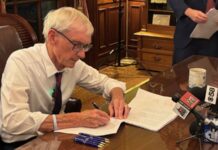As the war in Ukraine disrupts supply chains for fertilizers, grains and other agricultural products, the head of the Wilson Center sees a chance for Wisconsin ag industries to step in.
Mark Green is president, director and CEO of the nonpartisan Wilson Center in Washington, D.C. and a former state lawmaker, congressmen, ambassador to Tanzania and US AID director. His remarks came yesterday during a virtual trade policy luncheon hosted by WisPolitics.com, WisBusiness.com and the Wisconsin Technology Council and featuring ambassadors from Wisconsin.
“Russia and Ukraine have been the source for so many of those inputs, chemicals and fertilizers in particular, so I think that is an opening for Wisconsin agribusiness,” he said.
When asked “how much is enough” when it comes to imposing sanctions on Russia’s economy, the ambassadors agreed sanctions should be maintained or even expanded.
Richard Graber, a former U.S. ambassador to the Czech Republic who now heads The Bradley Foundation in Milwaukee, said “you can’t appease” Russian President Vladimir Putin.
“I would be in favor of ratcheting up those sanctions tougher than where they are right now,” he said. “Cut off his energy revenue and ultimately bring an end to this guy and his rule.”
Tom Loftus, a former U.S. ambassador to Norway and former speaker of the state Assembly, added sanctions “are the new containment strategy. They’re not going to go away.”
Meanwhile, U.S. Ambassador to Luxembourg and former Milwaukee Mayor Tom Barrett expressed “guarded hope” that the international community can mitigate impacts of the conflict on fuel supplies and energy prices globally. He also said sanctions have “clearly” had an economic impact on Russia.
“The more we can just keep our foot on the gas pedal with these sanctions, I think that that’s very, very important,” he said.
Green agreed with Barrett and said he’s impressed with how President Biden has rallied allies within NATO and Europe more broadly. But he noted countries imposing sanctions on Russia represent just 15 percent of the world’s population, pointing to countries like China and India — as well as most African nations — that haven’t sided with the United States on this issue.
“We have work to do if we’re going to expand this, because right now, it’s still a very small part of the world that is fully on board with us,” he said. “The parts that are, it’s impressive … but I think there’s a long way to go before we can say that this is, you know, somehow bringing Putin to his knees.”
Green also noted Russia’s economy is projected to contract between 7 and 10 percent this year, while Ukraine’s economy is expected to shrink 45 percent.
Loftus said the United States and allies getting more energy supplies such as natural gas to the European Union is essential “so Russia does not have a chokehold” on member nations. Panelists agreed the issue of limited energy reserves and reliance on Russian energy is a problem throughout Europe.
Graber underlined the difficulty with unifying EU member nations, noting the various histories, languages and cultures pose a challenge for finding areas of agreement.
“But I think the Europeans are seeing really clearly that this dependence on Russian energy is a mistake, and really has them in a very tough spot right now,” he said, noting the Czech Republic imports about 86 percent of its gas and up to 50 percent of its oil from Russia.
The impact of the conflict in Ukraine is compounding the persistent effects of COVID-19, Green noted, forcing businesses and policymakers to rethink how they approach trade and supply chains.
“Oftentimes trade and commerce moves to the lowest-cost supplier,” Green said. “Well maybe now it moves to a low-cost supplier but one that’s reliable, one that’s predictable, one that’s sustainable … so that also creates opportunities.”
Watch a video of the discussion here: https://www.youtube.com/watch?v=8IKknuuFAq4
–By Alex Moe





